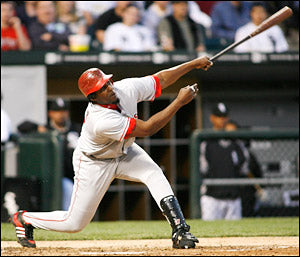Recently I wrote this guest follow up blog post for John Creel and The Right Spot Newsletter. The Right Spot is a non profit organization supporting Youth athletic and after school programs and offering opportunities to underpaid college coaches in North Carolina.
Be sure to Subscribe the the Newsletter HERE so that you don't miss any new issues!
In my last blog I talked about why kids quit baseball. One of the main reasons is they no longer have the tools and ability to compete on their current level
Regardless of what level you are, you are almost always in a state of “moving up”. Whether you are an 8U player moving to 9U, a 12U player moving to 13U, A JV player moving to Varsity, a Varsity player moving to college, and so the wheel continues on.
At each level there are different challenges that require better, more refine tools and skills.

What tools and skills?
For as long as scouts have been evaluating baseball/softball players they have looked at player skills in 5 key areas.
Running speed
Hitting for power
Bat to ball skills
Defense
Arm Strength
You’ve probably heard the term “5 tool player” before. These are the 5 tools, and if you step on a baseball field someone, at some point, is going to evaluate these attributes about you as a player.
Am I good enough to keep going?
Here is an exercise I invite you to try. Go to a game at the next level you aspire to play. What attributes do the players have? How do you measure up to them? Could you hang?
Parents often sacrifice results NOW for building and investing into the skill tool box for later. Skills take time. Physical strength takes time. There isn’t a short way to build it.
It is easy to get trapped by the short term payoff of “just throw strikes” or “just make contact” of youth baseball. I will not argue that this absolutely does get you some level of short term success and probably earns you innings on the mound or at bats at the plate. In an youth sports environment that is highly incentivized by winning, players that provide these safe successes often get the playing time that help the coach win and keep the parents happy.
But at what expense?
Eventually, your skills are going to have to stand up to the demands of the game, and the demands of the game get higher as you move up
How good do I need to be?
At every level of baseball/softball you need to be educated and aware of what do the players in front of me do and look like. Below are pitch velocity charts (Arm Strength) and Bat speed charts (hitting for power) taken from the Diamond Kinetics national database.
Yes, you have to command the ball, and yes, you have to contact the ball but without the underlying speed and power numbers the amount of doors open to you will become more limited before there are no more doors opened to you.
Eventually there will be more powerful players that command the ball and contact the ball the same way you do at higher rates of speed, and you will no longer get opportunites


Why The Game Can Be A Misleading Measuring Stick of Your Skills
Games are necessarily but often a bad measuring stick for the question "How good am I"
Especially at the youth level.
If you have 60th percentile action capacities and your winning/ piling up stats against competition that has 40th percentile action capacities, are you “good”?
It would be easy to think you're "good" but what happens when you play teams with 80th, 90th, 95th percentile capacities?
My point is focus on developing the measurable action capacities while playing games and don't get distracted by wins or stats. They can be both misleading and distracting in the process of getting good enough
How Do I Get Better?
Nothing worth improving comes without a sacrifice. In this case sacrificing time to consistently measuring and deliberately focusing on improving your physical attributes. Getting stronger and improving your movement patterns is key.
Research shows that strength training combined with weighted bat and weighted balls, when used corrected, have been successful in helping players unlock the power numbers needed to keep opening doors.
These are protocols that I have used in training players for many years to see measurable improvement in their underlying tools and skills.
Conclusion
Being good enough is a critcal part to keep playing sports as long as you can. This requires patience from the parents and time invested to consistently pursue the underling physical tools from the player.
It just takes time.
It just does.
There is no way around that.
Don’t get blinded by the short term payoff of a youth baseball landscape that is optimized towards winning and rewards short term safe success. It will cost you in the long run.
Keep opening doors








